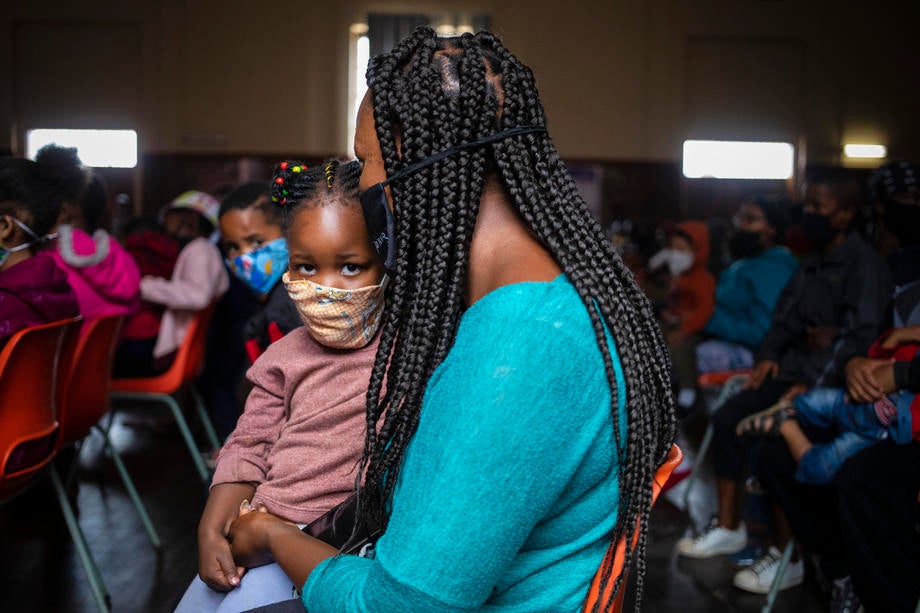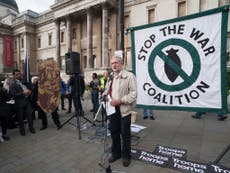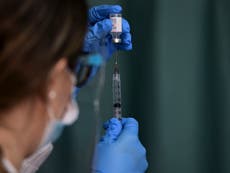‘Virus is now killing people silently’: Covid cases surge in parts of Africa amid second wave
Coronavirus is on the rise again across the continent, posing a new, possibly deadlier threat

Your support helps us to tell the story
From reproductive rights to climate change to Big Tech, The Independent is on the ground when the story is developing. Whether it's investigating the financials of Elon Musk's pro-Trump PAC or producing our latest documentary, 'The A Word', which shines a light on the American women fighting for reproductive rights, we know how important it is to parse out the facts from the messaging.
At such a critical moment in US history, we need reporters on the ground. Your donation allows us to keep sending journalists to speak to both sides of the story.
The Independent is trusted by Americans across the entire political spectrum. And unlike many other quality news outlets, we choose not to lock Americans out of our reporting and analysis with paywalls. We believe quality journalism should be available to everyone, paid for by those who can afford it.
Your support makes all the difference.At the centre of a terrifying coronavirus surge, 242 patients lay in row after row of beds under the soaring metal beams of a decommissioned Volkswagen factory.
Workers at the vast field hospital could provide oxygen and medications, but there were no intensive care unit beds, no ventilators, no working phones and just one physician on duty on a recent Sunday – Dr. Jessica Du Preez, in her second year of independent practice.
In a shed-like refrigerator behind a door marked “BODY HOLD”, carts contained the remains of three patients that morning. A funeral home had already picked up another body.
On rounds, Du Preez stopped at the bed of a 60-year-old patient, a grandmother and former college counselor. Her oxygen tube had detached while she was lying prone, but the nurses had so many patients they hadn’t noticed. Now, she was gone.
As two porters placed her corpse in a bag, a worker peeked through the door to tell them another patient, a 67-year-old diabetic man, had died.
Meanwhile, the condition of a teacher in her 50s was deteriorating. Du Preez tried to find ICU space for her elsewhere in the city, to no avail. She called the teacher’s husband, who asked what he could do. “Not much,” the young doctor responded.
“Shame,” she said again and again that day.
For hours, the alarm on the teacher’s bedside monitor bleated. Her oxygen level was dangerously low, her pulse racing and her blood pressure soaring. Still, she remained conscious, saying she could not breathe. That evening, she died alone. A book, “A Heartbeat of Hope: 366 devotions,” lay on her bedside stand alongside a pair of reading glasses.
When the pandemic began, global public health officials raised grave concerns about the vulnerabilities of Africa. But its countries overall appeared to fare far better than those in Europe or the Americas, upending scientists’ expectations. Now, the coronavirus is on the rise again in swaths of the continent, posing a new, possibly deadlier threat.
In South Africa, a crush of new cases that spread from Port Elizabeth is growing exponentially across the nation, with deaths mounting. Eight countries, including Nigeria, Uganda and Mali, recently recorded their highest daily case counts all year. “The second wave is here,” John N. Nkengasong, the head of the Africa Centers for Disease Control and Prevention, has declared.
When the virus was first detected, many African countries were considered particularly at risk because they had weak medical, laboratory and disease-surveillance systems and were already battling other contagions. Some were riven by armed conflict, limiting health workers’ access. In March, Tedros Adhanom Ghebreyesus, the first African director-general of the World Health Organization, cautioned, “We have to prepare for the worst”.
But many African governments pursued swift, severe lockdowns that – while financially ruinous, especially for their poorest citizens – slowed the rate of infection. Some deployed networks of community health workers. The Africa CDC, the WHO and other agencies helped expand testing and moved in protective gear, medical equipment and pharmaceuticals.
The reported toll of the pandemic on the continent – 2.6 million cases and 61,000 deaths, according to the Africa CDC – is lower than what the United States alone currently experiences in three weeks.
But that accounting is almost certainly incomplete. Evidence is growing that many cases were missed, according to an analysis of new studies, visits to nearly a dozen medical institutions and interviews with more than 100 public health officials, scientists, government leaders and medical providers on the continent.
“It is possible and very likely that the rate of exposure is much more than what has been reported,” Nkengasong said.
Now, as they battle new outbreaks, doctors are convinced that deaths have also gone uncounted. Dr. John Black, the only infectious-disease specialist for adults in Port Elizabeth, said he and other physicians feared that many people were dying at home. Indeed, a government analysis showed that there had been more than twice as many excess deaths as could be explained by confirmed cases in South Africa. “We don’t know what the real number is,” he said.
Scientists are also considering other explanations for the continent’s outcome. These range from the asymptomatic or mild infections more common in youth – the median age in Africa is just 19.7, about half that of the United States – to unproven factors including preexisting immunity, patterns of mobility and climate. If those conditions helped protect against the virus earlier, officials ask, will they do so now?
In South Africa, the continent’s leader by far in coronavirus cases and deaths, the growing devastation in its medical system has led to the rationing of care for older adults. Last week, officials announced that a new variant of the virus that may be associated with faster transmission has become dominant. With stricter control measures lifted and many people no longer seeing the virus as a threat, public health officials fear that Africa’s second wave could be far worse than its first.
“The risk perception has gone from something very scary at the beginning to now something people are not worried about anymore,” said Dr. Chikwe Ihekweazu, director-general of the Nigeria Center for Disease Control.
‘Killing People Silently’
In Howlwadaag, a rubble-filled settlement in Hargeisa for Somali and Ethiopian refugees displaced by conflict and drought, the risks of transmission were evident. Residents live among prickly cactuses, sleeping in crowded corrugated sheet metal shacks and rounded cloth-covered dwellings. Polio outreach workers advised residents to sleep separately if sick and wash their hands often. But community members said they could not afford soap.
A woman complaining of a cough and difficulty breathing rejected the advice of health workers to go to the hospital one day this month. “I’m afraid of people not being able to come see me,” said Khadra Mahdi Abdi, adding that the price of transport was too steep.
In the region, the pandemic often inspires denial. Restaurants are busy, social distancing rare, large family gatherings common. Mask wearing carries a stigma.
“People are watching you and point their fingers at you and say, ‘This is corona man’,” said Hassan Warsame Nor, a senior lecturer at Benadir University, in Mogadishu, who led a UNICEF study of attitudes in Somalia’s capital.
And resisting medical treatment is routine.
At Hargeisa’s designated Covid hospital, Daryeel, five patients separated by empty metal frame beds lay beside hissing oxygen tanks, with handwritten medication orders taped to the walls. Nurses swatted away flies that flew in through windows facing a courtyard, where patients were sometimes rolled for a dose of sunshine and bird song. Most had a family member attending them, which the hospital director, Dr. Yusuf M. Ahmed, felt compelled to allow.
He said that about 80 per cent of patients scheduled for transfer to Daryeel after testing positive at the main public hospital never showed up. People were dying at home. “The virus is now killing people silently,” said Dr. Hussein Abdillahi Ali, a junior physician there.
Judging by the condolence pages on Facebook, the director said, Covid-19 has come back “with a vengeance".





Join our commenting forum
Join thought-provoking conversations, follow other Independent readers and see their replies
Comments